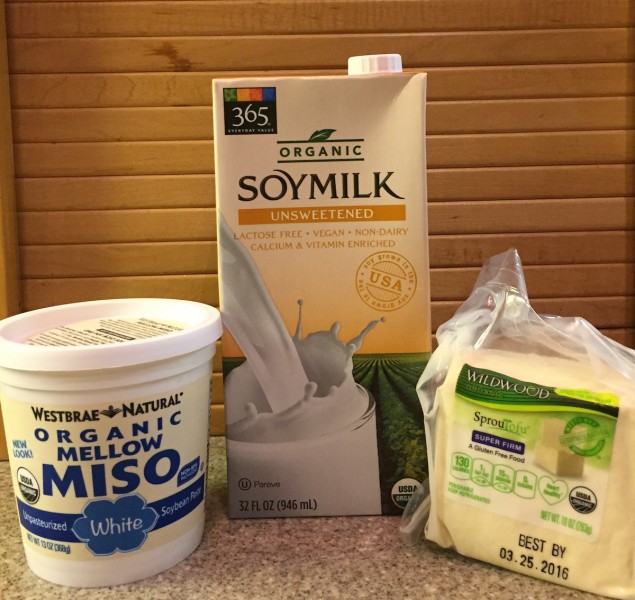I have had several friends tell me that they avoid soy products (edamame, tofu, tempeh, miso, and soy milk) due to the plant estrogens that they fear contribute to hormone-related cancers such as breast, uterine and ovarian in women and prostate in men. However, numerous scientific studies indicate that soy products actually reduce the risk of these cancers and prevent the risk of breast cancer recurrence.
Soybeans contain a class of phytoestrogens or plant estrogens called isoflavones. This plant estrogen does not have the same effect on your body as animal estrogen. According to Dr. Michael Greger in his book “How Not To Die”, “phytoestrogens dock into the same receptors as your own estrogen but have a weaker effect, so they can act to block the effects of your more powerful estrogen.”
Breast cancer:
Soy phytoestrogens reduce the risk of breast cancer. In addition to blocking the effects of your own estrogen, soy reactivates the “caretaker genes” of BRCA1 and BRCA2 which are cancer-suppressing genes responsible for DNA repair. Mutations in the BRCA genes cause a rare form of hereditary breast cancer which accounts for 2.5% of breast cancer cases. Breast tumors appear to turn off the expression of the BRCA genes through a process called methylation. Soy also helps women with other breast cancer susceptible genes called MDM2 and CYP1B1.
The benefits of soy also extend to women with breast cancer. Five studies have shown that the women with breast cancer who ate the most soy lived longer and had a lower risk of recurrence. This is true for women with estrogen-receptor-positive breast cancer and estrogen-receptor-negative breast cancer. According to PCRM.org, “a study in the Journal of the American Medical Association reported results based on 5,042 women previously diagnosed with breast cancer who were participating in the Shanghai Breast Cancer Survival Study over a four-year period. The study showed that women who regularly consumed soy products, such as soymilk, tofu, or edamame, had a 32 percent lower risk of recurrence and a 29 percent decreased risk of death, compared with women who consumed little or no soy.”
Other female hormonal cancers:
An article in the Academy of Nutrition and Dietetics entitled Soy and Hormone Related Cancers states that “compared with women who do not eat soy, women who regularly eat soy tend to have lower endometrial cancer risk.” And studies on ovarian cancer found the same result. An article called Eating Soy for Ovarian Cancer Prevention states that “studies continue to identify dietary soy as a factor for decreasing the risk of ovarian cancer.”
Prostate cancer:
Soy is also beneficial to men. According to an article published by PCRM.org, Soy and Your Health, “an analysis of 14 studies published in the American Journal of Clinical Nutrition showed that increased intake of soy resulted in a 26 percent reduction in prostate cancer risk. Researchers found a 30 percent risk reduction with non-fermented soy products such as soymilk and tofu.”
Thyroid
The same PCRM.org article states that “soy isoflavones may take up some of the iodine that the body would normally use to make thyroid hormone.” Therefore, people who consume soy may need to boost their intake of iodine, which you can get from many plant foods, seaweed and iodized salt. Soy products may impact your body’s ability to absorb medicines used to treat hypothyroidism. If you are on medication for hypothyroidism, check with your health care provider about consuming soy products.
Conclusion:
Scientific and human observational studies indicate that minimally processed soy products such as edamame, soy milk, tofu, tempeh and miso can help prevent cancer and its recurrence. I recommend eating organic, non-GMO soy and avoiding highly processed soy meat alternatives, such as soy hot dogs or other foods made with soy protein isolate. Check with your doctor if you are on hypothyroid medications. Enjoy your soy!
Additional References:
- Soy products in the management of breast cancer
- Soy food intake after diagnosis of breast cancer and survival: an in-depth analysis of combined evidence from cohort studies of US and Chinese women
- Soy consumption and prostate cancer risk in men: a revisit of a meta-analysis
- Can soy phytoestrogens decrease DNA methylation in BRCA1 and BRCA2 oncosuppressor genes in breast cancer?


I’ve heard that it’s okay to eat natural soy like tofu, soy milk, tempeh or miso but a weight loss program I was on made their meals with soy protein isolate as their main ingredient. I was on this diet for quite a while– 4 years and lost 25 pounds but when I was diagnosed with breast cancer this year, I stopped taking their meal replacement products. Could you address this issue?
Hi Vasi,
PCRM.org and Nutritionfacts.org recommend natural soy products. I prefer organic, which is non-GMO. Here is a link to some information on this topic from PCRM.org. http://www.pcrm.org/health/health-topics/soy-and-your-health
Overnutrition
Soy products are typically high in protein. Some manufacturers have exploited this fact, packing isolated soy protein into shakes and turning it into meat substitutes. However, it may be prudent to avoid highly concentrated proteins from any source, including soy. It has long been known that cow’s milk increases the amount of insulin-like growth factor in the bloodstream,23 and this compound is linked to higher cancer risk. Some evidence suggests that highly concentrated soy proteins (indicated as “soy protein isolate” on food labels) can do the same.24 Simple soy products, such as tempeh, edamame, or miso, are probably the best choices.
Summary
Evidence to date indicates that soy products may reduce the risk of breast cancer and breast cancer recurrence. They do not appear to have adverse effects on the thyroid gland, but may reduce the absorption of thyroid medications. The benefits of soy products appear to relate to traditional soy products, not to concentrated soy proteins.
Also, as an aside, in How Not to Die, pages 196-197, Dr. Michael Greger stated the sipping green tea and eating mushrooms was associated with nearly 90% lower breast cancer odds. https://nutritionfacts.org/book/